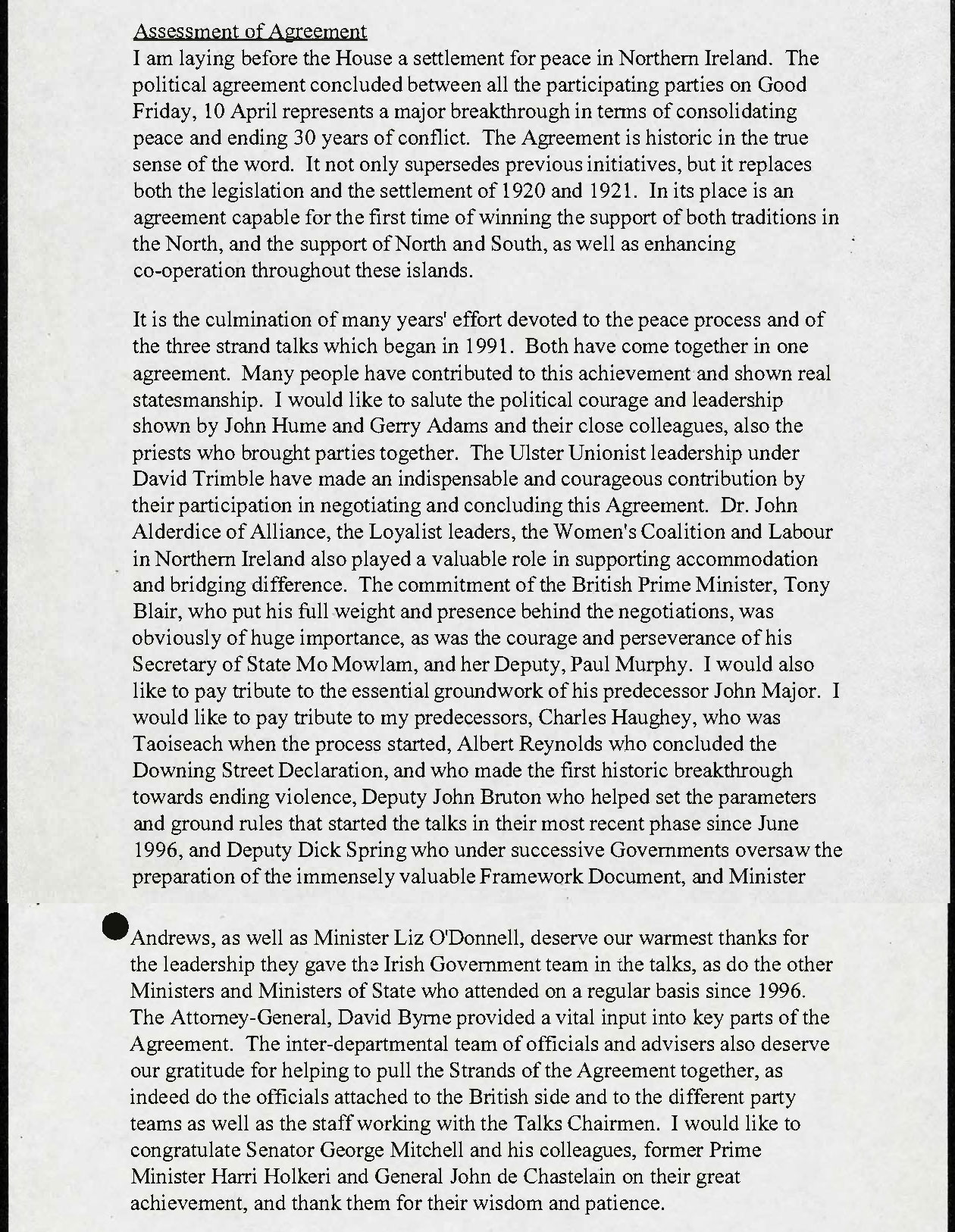
The text of a speech by the Taoiseach Mr. Bertie Ahern, TD on the Approval of the Multi-Party Agreement in Belfast on Good Friday, 10 April 1998. The speech was delivered on 22 April 1998.
Context notes
Bertie Ahern was the Irish Taoiseach, the Prime Minister of Ireland. In this speech he was setting out the Agreement to the Irish Seanad, the upper house of the Irish Dáil. The Agreement was the culmination of years of political initiatives, negotiations and many setbacks. It involved politicians from Northern Ireland, Britain, Ireland, the USA and the European Union.
Transcript
Assessment of Agreement
I am laying before the House a settlement for peace in Northern Ireland. The political agreement concluded between all the participating parties on Good Friday, 10 April represents a major breakthrough in terms of consolidating peace and ending 30 years of conflict. The Agreement is historic in the true sense of the word. It not only supersedes previous initiatives, but it replaces both the legislation and the settlement of 1920 and 1921. In its place is an agreement capable for the first time of winning the support of both traditions in the North, and the support of North and South, as well as enhancing co-operation throughout these islands.
It is the culmination of many years’ effort devoted to the peace process and of the three strand talks which began in 1991. Both have come together in one agreement. Many people have contributed to this achievement and shown real statesmanship. I would like to salute the political courage and leadership shown by John Hume and Gerry Adams and their close colleagues, also the priests who brought parties together. The Ulster Unionist leadership under David Trimble have made an indispensable and courageous contribution by their participation in negotiating and concluding this Agreement. Dr. John Alderdice of Alliance, the Loyalist leaders, the Women’s Coalition and Labour in Northern Ireland also played a valuable role in supporting accommodation and bridging-difference. The commitment of the British Prime Minister, Tony Blair, who put his full-weight and presence behind the negotiations, was obviously of huge importance, as was the courage and perseverance of his Secretary of State Mo Mowlam, and her Deputy, Paul Murphy. I would also like to pay tribute to the essential groundwork of his predecessor John Major. I would like to pay tribute to my predecessors, Charles Haughey, who was Taoiseach when the process started, Albert Reynolds who concluded the Downing Street Declaration, and who made the first historic breakthrough towards ending violence, Deputy John Bruton who helped set the parameters and ground rules that started the talks in their most recent phase since June 1996, and Deputy Dick Spring who under successive Governments oversaw the preparation of the immensely valuable Framework Document, and Minister Andrews, as well as Minister Liz O’Donnell, deserve our warmest thanks for the leadership they gave the Irish Government team in the talks, as do the other Ministers and Ministers of State who attended on a regular basis since 1996. The Attorney-General, David Byrne provided a vital input into key parts of the Agreement. The inter-departmental team of officials and advisers also deserve our gratitude for helping to pull the Strands of the Agreement together, as indeed do the officials attached to the British side and to the different party teams as well as the staff working with the Talks Chairmen. I would like to congratulate Senator George Mitchell and his colleagues, former Prime Minister Harri Holkeri and General John de Chastelain on their great achievement and thank them for their wisdom and patience.
Questions
Content
- Make a list of the individuals and groups who, according to Ahern, contributed to the Agreement.
Inferences from the Content
- Is it reasonable for a historian to infer that Bertie Ahern was proud of the Agreement? Explain your answer.
- Is it reasonable to infer that the Agreement was the result of close co-operation between politicians in Britain, Northern Ireland and Ireland? Explain your answer.
Inferences from the Context
- Why does Ahern believe that the Agreement is historic?
Lines of Argument
Which line(s) of argument A-E could use this document as supporting evidence?
